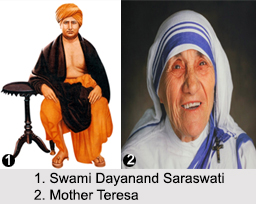 Indian Social Reformers have successfully contributed in eradicating the social evils. While some of the eminent personalities voiced their support for Women Education, some Indian social reformers supported Widow Remarriage. The reformers in India have worked towards building a better nation without any bias.
Indian Social Reformers have successfully contributed in eradicating the social evils. While some of the eminent personalities voiced their support for Women Education, some Indian social reformers supported Widow Remarriage. The reformers in India have worked towards building a better nation without any bias.In India, society and religion are interconnected. Hence the religious evils, such as, superstition, blind faith and others have affected the society again and again. Alongside the religious leaders the Indian social reformers also strove to liberate the people from such prevalent vices. Hailing from different religious and social backgrounds, they have adopted simple methods to educate the masses. Songs, poetry in colloquial languages, moral tales, organising community works and others are some of the methods that the Indian social reformers implemented to achieve their aims.
Famous Indian Social Reformers
The Indian social reformers’ consistent efforts were recognised even by the British imperialists. Indian personalities like Swami Vivekananda, Ishwar Chandra Vidyasagar, Ramakrishna Paramahansa, Dayanand Saraswati, Raja Ram Mohan Roy and others spoke up for the development and enlightenment of women. Under the British rule the Indian social reformers also popularised Western education. Amongst the most prominent Indian social reformers, Mahatma Gandhi, Shriram Sharma Acharya, Virchand Gandhi, Gopal Hari Deshmukh, Jamnalal Bajaj, Balshastri Jambhekar, Jawaharlal Nehru, Vinoba Bhave, Dhondo Keshav Karve, Annie Besant, B R Ambedkar, Vitthal Ramji Shinde, Pandurang Shastri Athavale, Kandukuri Veeresalingam and Kiran Bedi are worth mentioning.
Raja Rammohan Roy: Raja Ram Mohan Roy was the first person who recognized these inhuman practices and decided to fight against the same. He is considered as the architect of Indian Renaissance and father of modern India. This Indian social reformer was the founder of the Brahmo Samaj, a socio-religious reform movement in the Indian subcontinent, which crusaded against Hindu customs as sati, polygamy, child marriage and the caste system. Raja Ram Mohan Roy also demanded the property inheritance rights for women.
 Swami Vivekananda: Though Swami Vivekananda had not initiated any particular social reform but his speeches and writings were full of messages against all kinds of social and religious evils. His main focus was on removing the weakness of India’s youth of the time, both physical as well as mental. Vivekananda was one of the main Indian social reformers who preached Neo-Vedanta, which roughly translates to Hindu modernism. His reinterpretation of the concept is still very successful which has created a new understanding and appreciation of Hinduism within and outside India. It was his influence that was the principal reason for the enthusiastic reception of yoga, transcendental meditation and other forms of Indian spiritual self-improvement in the West.
Swami Vivekananda: Though Swami Vivekananda had not initiated any particular social reform but his speeches and writings were full of messages against all kinds of social and religious evils. His main focus was on removing the weakness of India’s youth of the time, both physical as well as mental. Vivekananda was one of the main Indian social reformers who preached Neo-Vedanta, which roughly translates to Hindu modernism. His reinterpretation of the concept is still very successful which has created a new understanding and appreciation of Hinduism within and outside India. It was his influence that was the principal reason for the enthusiastic reception of yoga, transcendental meditation and other forms of Indian spiritual self-improvement in the West.Swami Dayanand Saraswati: Swami Dayanand was the great believer in the teachings of Vedas. He criticized Hindu religious texts for perpetuating Idol worship and other superstitions. He argued against all wrong things being propagated in the name of Hinduism.
Jyotirao Phule: Jyotirao Phule devoted his whole life for the weaker and depressed section of society. He was also against child-marriages and was a great supporter of widow remarriage. He was very sympathetic to the cause of distressed women and opened a home for such poor and exploited women where they could be taken care off. He and his wife, Savitribai Phule, were pioneers of women education in India. The couple was among the first native Indians to open a school for girls of India.
In the rich tapestry of Indian
literature, Kuvempu stands tall as a luminary, an icon whose work has left an
indelible mark on Kannada literature and culture. Born as Kuppali Venkatappa
Puttappa on December 29, 1904, in the quaint village of Kuppali in Karnataka,
India, Kuvempu emerged as a prolific writer, playwright, and an ardent advocate
of the Kannada language. Fondly remembered as the "Rashtrakavi"
(National Poet), Kuvempu's literary journey traverses themes of humanism,
nationalism, and the essence of nature, reflecting his profound vision and
understanding of life's nuances.
For more, visit the page below: